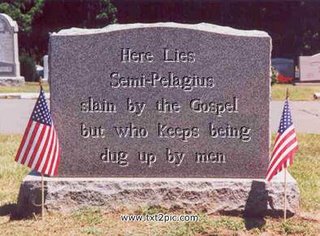 Two Extremes to be Avoided
Two Extremes to be Avoided"For the former [sacerdotal error], no real sacrament actually exists: baptism is regeneration, and the bread and wine become the body and blood of Christ. The sign is swallowed by the signified: it no longer exists, despite appearances to the contrary. For the latter [memorialist error] also, there really can be no sacrament, for all that is left is the bare sign itself. Baptism and the Lord's Supper may be occasions for a spiritual event by encouraging the participant's powers of reflection, self-examination, and pious memory, but they are not themselves regarded as the occasions of God's powerful witness and work." Michael Horton,
God of Promise. P.157
The Real Presence"The Reformed did not, therefore, deny the reality of the presence of Christ in the sacrament but strenuously affirmed the union - not transubstantiation or commingling - of the sign with the thing signified. . .Reformed theology does hold to the real presence of Christ in the Lord's Supper but does not limit the supper to the elements themselves. . .'It is a great mistake to confuse the idea of 'presence' with that of nearness in space. . . 'Presence,' therefore, is not a question of space; it is relation.' This is the crux of the Reformed understanding of the eucharistic presence. As grace is not a question of substance but divine acceptance, the sacramental presence is not a question of space but of covenant ratification and assurance. It is here, at the font and the communion table, as well as in the pew as we hear the gospel preached, that the question is finally settled for us: God is present; he is near. And he comes in peace." Michael Horton,
God of Promise. P.168, 170.
Christ Unites"The Word, baptism, and the Lord's Supper form a single island of divinely created unity out of the world's divisive rivalries. Here is the one place where all are one in Christ. It's not the musical style that unites them, the socioeconomic or racial complexion of the community, the age or political orientation. Here, in the pew, at the font, and at the table, only one division really matters: Christ and idols." Michael Horton,
God of Promise. P. 160.





